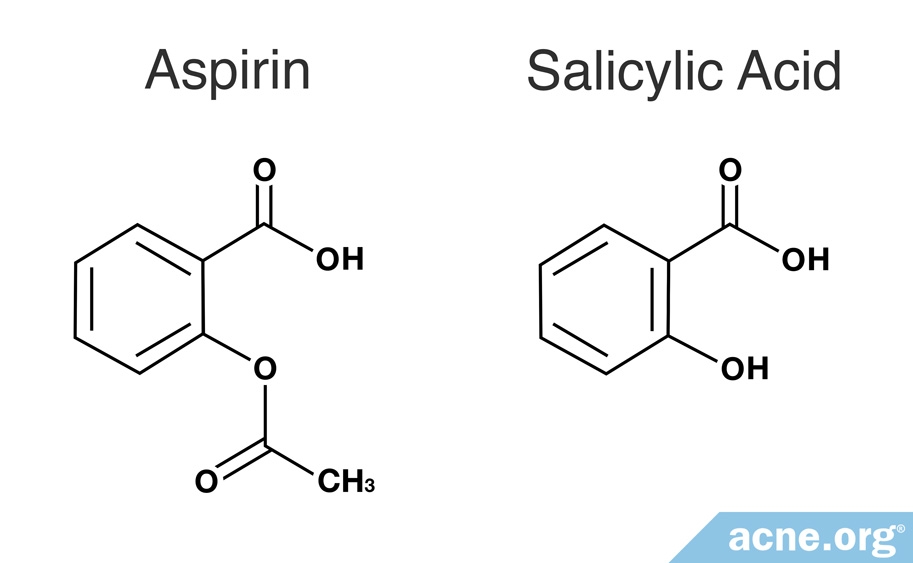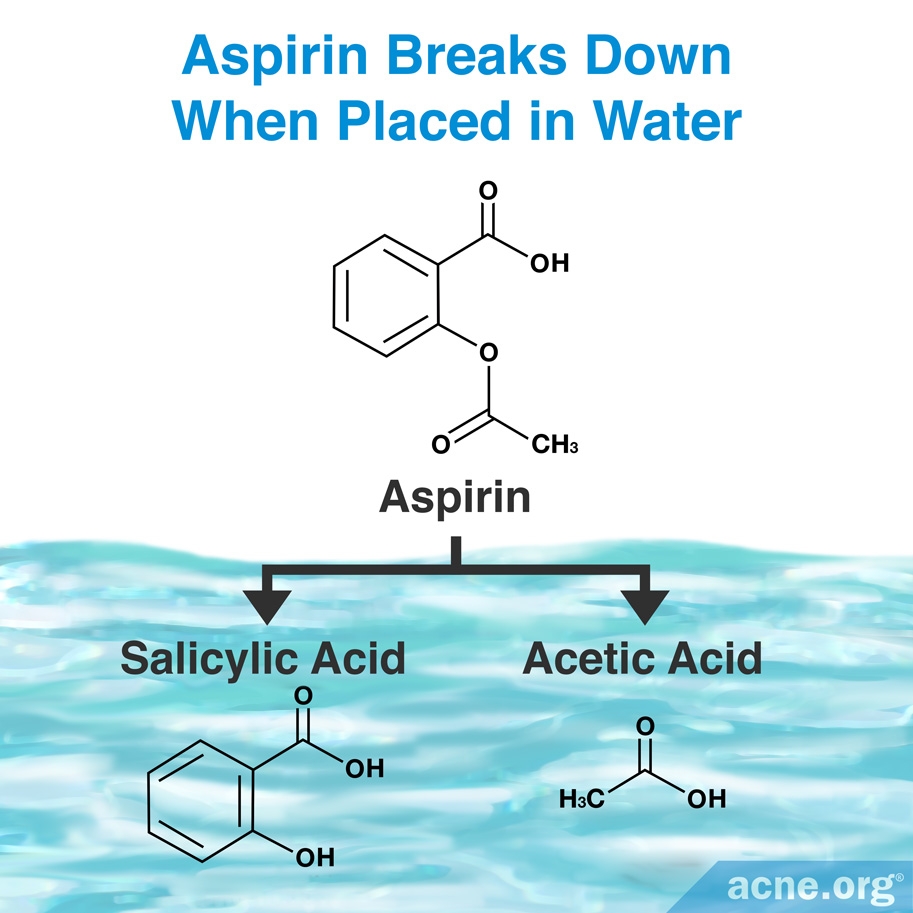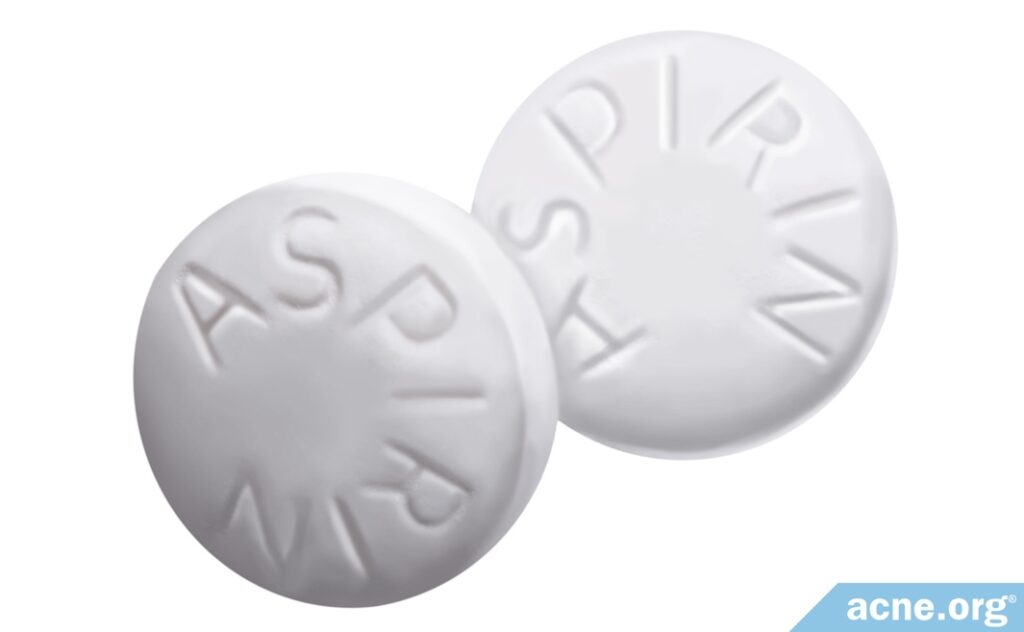Views: 0
It Can Hypothetically Help A Bit, but Is Dangerous. Buy Over-the-counter Salicylic Acid Products Instead.

The Essential Info
When dissolved in water, aspirin breaks down into salicylic acid, which you may have seen listed as an active ingredient on over-the-counter acne products before. Salicylic acid has skin-shedding and anti-inflammatory properties, and can help reduce acne symptoms.
In an attempt to treat their acne at home, some people try dissolving aspirin and applying it as a mask. This is risky and unnecessary.
Why It’s Risky: Salicylic acid can cause skin burns and even life-threatening systemic complications when applied in too high a strength. This is why salicylic acid is only available over-the-counter in up to 2% strength. It is difficult to control your dosage of salicylic acid when dissolving and applying aspirin at home.
Why It’s Unnecessary: Since over-the-counter salicylic acid products are plentiful, safe, and easy to find, a better route is to simply purchase an over-the-counter salicylic acid product. Note: Salicylic acid on its own does not normally provide impressive clearing of acne.

The Science
Aspirin is one of the most widely used drugs in the world. It was created from a plant-derived chemical called salicylate, which people frequently used in the 18th century to reduce the fever, pain, and inflammation caused by diseases such as rheumatic fever and rheumatoid arthritis. However, salicylate caused side effects that often would prevent people from using it. Therefore, in 1895, Frederick Bayer of Bayer pharmaceuticals altered the chemical structure of salicylate to create a new form of salicylate that did not cause side effects. With these alterations, salicylate became acetylsalicylic acid, which is more commonly known as aspirin.1
The structure of aspirin (acetylsalicylic acid) is similar to that of salicylic acid, which is an acid very commonly used in the topical treatment of acne. In fact, when aspirin is placed in water, it breaks down into:
- Salicylic acid
- Acetic acid

For this reason, some people try dissolving aspirin pills in water at home and applying the watery paste to their skin in an attempt to help reduce acne.
When applied topically, salicylic acid:
- Promotes shedding of skin cells: This helps prevent clogged pores that can lead to acne lesions.
- Reduces inflammation: Acne is an inflammatory disease, so reducing inflammation is important when it comes to acne.
Because of the similarities between aspirin and salicylic acid, it is likely that aspirin may provide the same effects as salicylic acid when dissolved in water and applied topically.2,3,4
However, for safety reasons, salicylic acid is allowed in strengths up to 2% in over-the-counter products in the United States. Anything higher than this must be administered by an esthetician/cosmetician, nurse, or doctor.5,6 Because dissolving aspirin in water at home is unscientific, and aspirin tablets may vary in their ability to release salicylic acid, it is possible to obtain amounts of salicylic acid that are higher than the legal limit allowed over-the-counter. While this may sound like it would make it more effective, it can be dangerous for the following reasons:
- You can easily give your skin a chemical burn.
- If you put too much salicylic acid on a large area of skin for a prolonged period of time, it can become a life-threatening, systemic issue, which can result in major complications.4,5
When aspirin is placed in water, at least 4% of it gets converted into salicylic acid. For instance, a 325mg aspirin tablet would yield 13mg of salicylic acid when placed in water. However, the amount of aspirin converted into salicylic acid may be higher than 4% depending on the type of aspirin, for instance, if non-controlled-release aspirin tablets are used. In short, it is risky to try this at home, and it is wise to avoid attempting it.

Studies on Topical Aspirin
To know whether dissolved topical aspirin is effective or not, we would first need clinical trials, but there are no direct trials as such on acne, so we cannot say for sure whether topical aspirin will have effects similar to topical salicylic acid.
However, scientists have studied the effects of topical aspirin on skin inflammation in two studies. This is interesting to us because acne is an inflammatory disease. In both studies, the topical aspirin did not help when used to treat inflammation after the inflammation had already started, but did help prevent some inflammation when administered to the skin before inflammation began. Since acne is, at its root, an inflammatory disease, we can infer that topical aspirin may not be effective in reducing inflammation from acne already on the skin, but might help prevent some inflammation that could lead to the development of acne.6
When it comes to oral aspirin, research suggests that it might help with several skin conditions, including vitiligo and melanoma.7 However, no studies have looked at either oral or topical aspirin as an acne treatment.
Side Effects of Salicylic Acid and Topical Aspirin

Research on controlled and small doses of topical aspirin has found it to be a relatively safe drug. The same is true of salicylic acid. At over-the-counter dosages (less than 2%), salicylic acid causes only mild dryness and peeling in up to ⅓ of people who use it.8-11
However, since someone could dissolve many aspirin pills at once and then apply it to the skin, it is important to examine the side effects of salicylic acid when administered in higher doses. At high concentrations, salicylic acid can cause burns to the skin. Also, when applied over large parts of the body, and when left on the skin for extended periods of time, salicylic acid can cause serious, systemic problems, leading to hospitalization, and in rare cases, death.
For this reason, it is best to simply purchase over-the-counter salicylic acid at a safe percentage, up to 2%, and eliminate the trouble and risk of dissolving aspirin pills. Salicylic acid products are readily available at every drugstore and tend to be inexpensive.
References
- Botting, R., Vane, J. R. & Botting, R. M. The mechanism of action of aspirin. Thromb. Res. 110, 255 – 258 (2014). https://www.ncbi.nlm.nih.gov/pubmed/14592543
- Nyunt, M. S. Z. Topical Aspirin Gel Formulation and Assessment of Its Irritancy in an in Vivo Model. Master thesis, National University of Singapore (2004). https://www.ncbi.nlm.nih.gov/pubmed/20950659
- Goldsmith, L. A. Salicylic acid. Int. J. Dermatol. 18, 32-36 (1979). https://www.ncbi.nlm.nih.gov/pubmed/367978
- Bareggi, S. R., Pirola, R. & De Benedittis, G. Skin and plasma levels of acetylsalicylic acid: A comparison between topical aspirin/diethyl ether mixture and oral aspirin in acute herpes zoster and postherpetic neuralgia. Eur. J. Clin. Pharmacol. 54, 231 – 235 (1998). https://www.ncbi.nlm.nih.gov/pubmed/9681665
- Wang, Y. et al. Monitoring the hydrolyzation of aspirin during the dissolution testing for aspirin delayed-release tablets with a fiber-optic dissolution system. J. Pharm. Anal. 2, 386 – 389 (2012). https://www.ncbi.nlm.nih.gov/pubmed/29403772
- Thomsen, J. S., Benfeldt, E., Jensen, S. B., Serup, J. & Menné, T. Topically applied aspirin decreases histamine-induced wheal and flare reactions in normal and SLS-inflamed skin, but does not decrease itch. A randomized, double-blind and placebo-controlled human study. Acta Derm. Venereol. 82, 30 – 35 (2002). https://www.ncbi.nlm.nih.gov/pubmed/12013195
- Bubna, A. K. Aspirin in dermatology: Revisited. Indian Dermatol. Online J. 6, 428-435 (2015). https://www.ncbi.nlm.nih.gov/pubmed/26753146
- Rhein, L., Chaudhuri, B., Jivani, N., Fares, H. & Davis, A. Targeted delivery of salicylic acid from acne treatment products into and through skin: role of solution and ingredient properties and relationships to irritation. J. Cosmet. Sci. 55, 65 – 80 (2004). https://www.ncbi.nlm.nih.gov/pubmed/15037921
- Liu, H.et al. Topical azelaic acid, salicylic acid, nicotinamide, and sulphur for acne. Cochrane Database Syst. Rev. (2014). https://www.cochrane.org/CD011368/SKIN_topical-azelaic-acid-salicylic-acid-nicotinamide-and-sulphur-for-acne
- Goldstein, J. A. et al. Comparative effect of isotretinoin and etretinate on acne and sebaceous gland secretion. J. Am. Acad. Dermatol. 6, 760 – 765 (1982). https://www.ncbi.nlm.nih.gov/pubmed/6461679
- Arif, T. Salicylic acid as a peeling agent: a comprehensive review. Clin. Cosmet. Investig. Dermatol. 8, 455 – 461 (2015). https://www.ncbi.nlm.nih.gov/pubmed/26347269
The post Do Aspirin Masks or Other Forms of Topical Aspirin Work to Clear Acne? appeared first on Acne.org.

